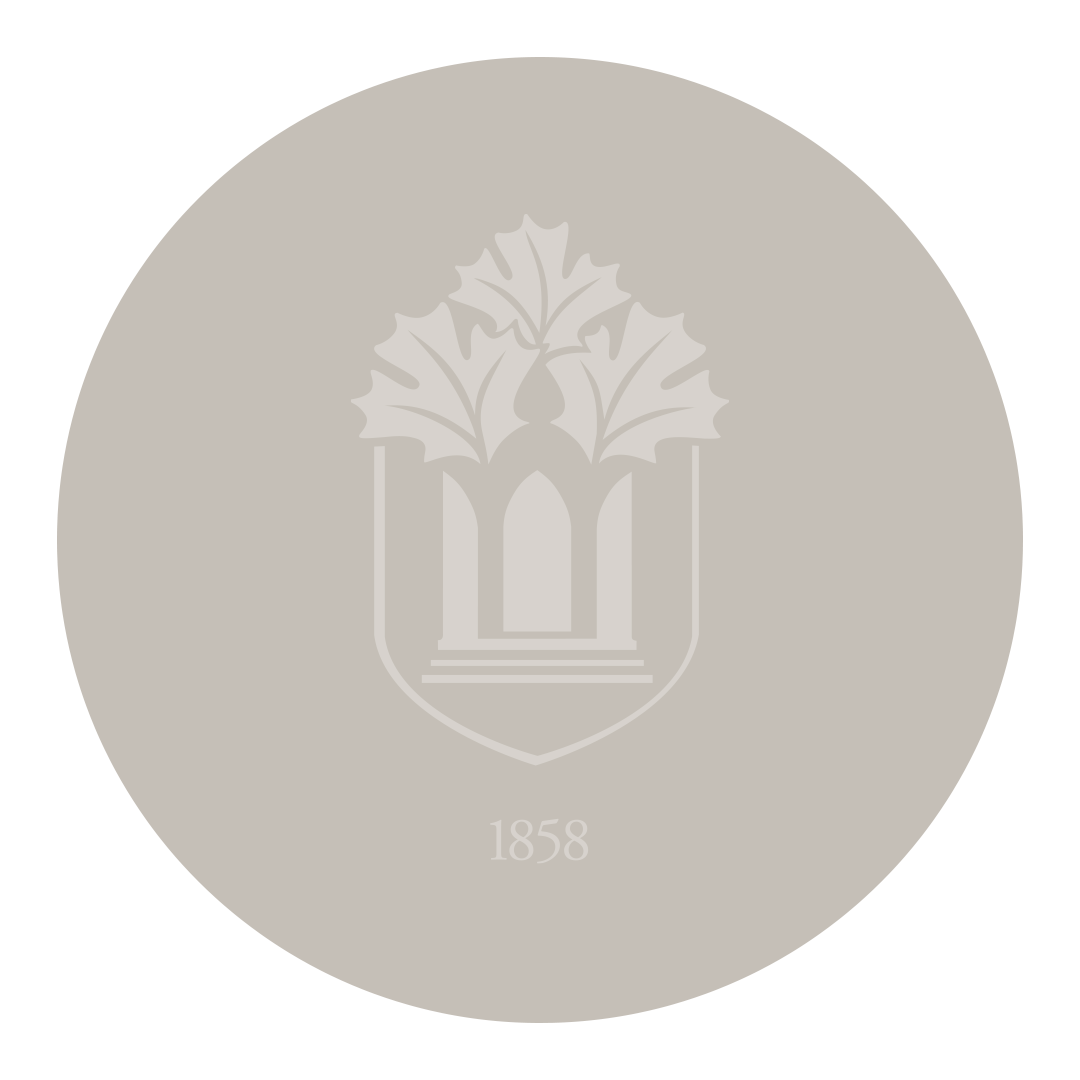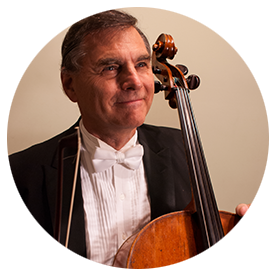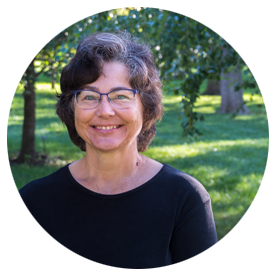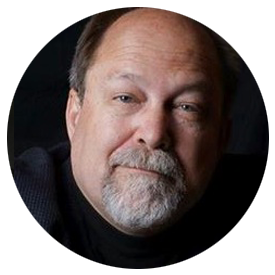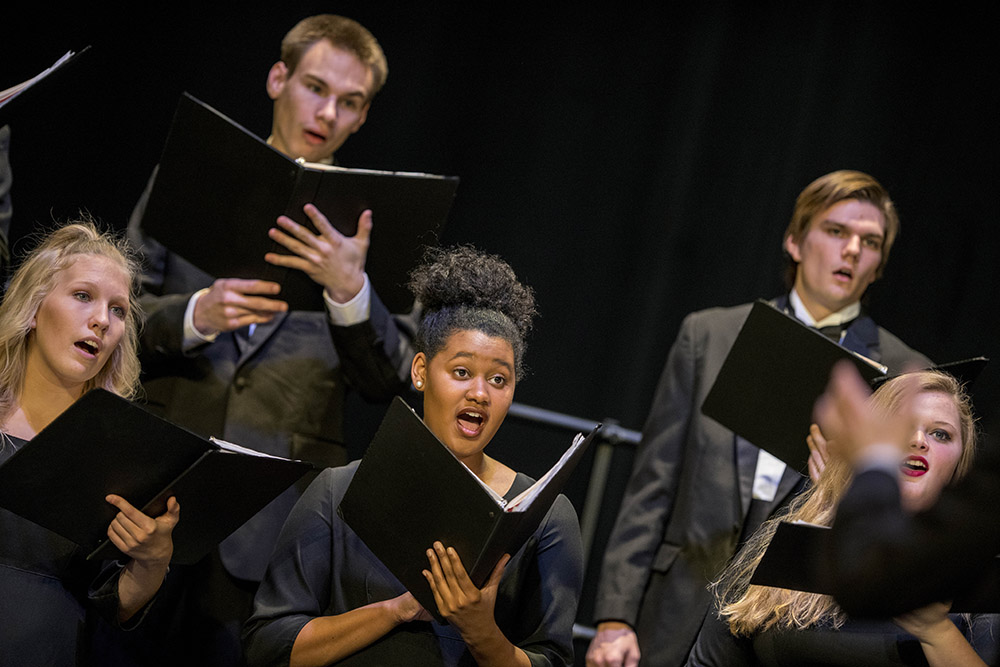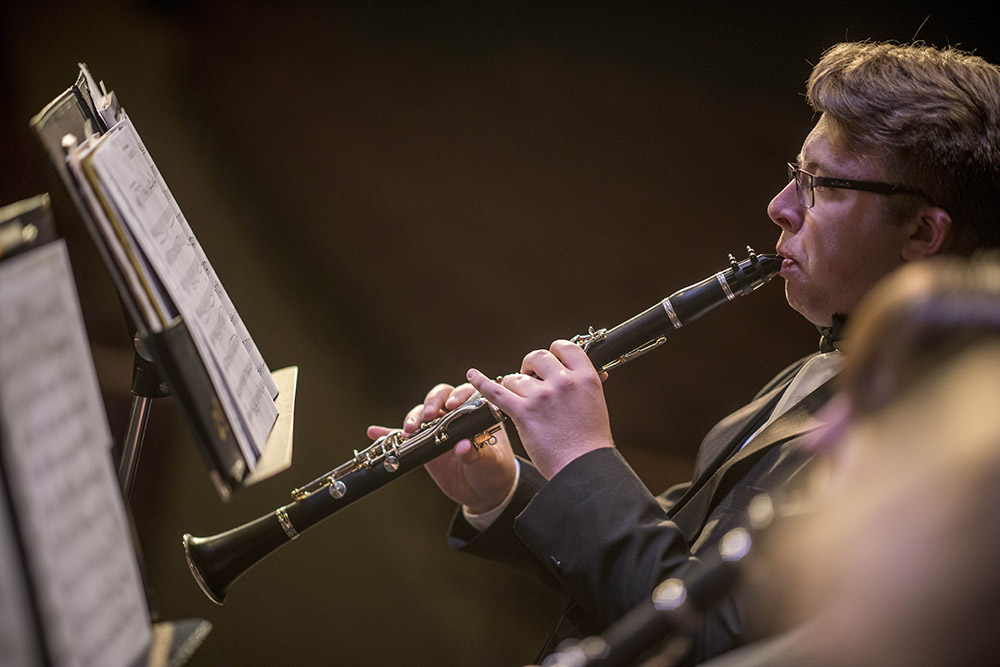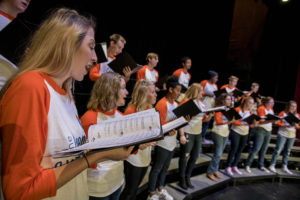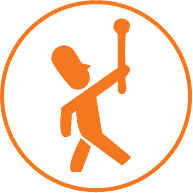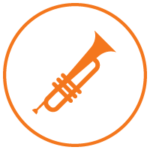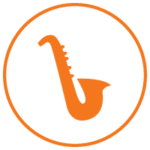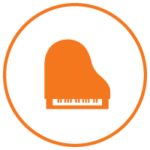MU 109 – Jazz History in America 3 hrs.
Jelly Roll, Kid, Sidney, Duke, Count, Satchmo, Fatha, Miles, and Bird: magical names that evoke the exciting world of jazz: one of America’s greatest gifts to the world. This course is an intensive examination of the social forces, political conditions, personalities, and creative geniuses that combined to form the music that many have called America’s only indigenous art form. Through an understanding of its roots, development, formal structure, and design, jazz becomes accessible to students and forms a basis for appreciating its sophistication, subtleties, and various modes of expression.
MU 120 – Understanding Music 3 hrs.
This course is designed as an introduction to music, presupposing no prior technical knowledge on the part of the student. It provides information of an analytical, stylistic, and historical nature, and is designed to lead the student to a critical understanding of the composer and the musical product.
MU 126 – Class Guitar 1 hr.
The general objective of this course is to provide the student with a foundation in guitar technique upon which to base further study of the instrument. Class guitar is designed for the beginning guitarist with no previous formal guitar instruction. Instruction will be provided in tuning, basic chords, reading music in standard notation, using tablature, learning notes in first position, picking, and strumming. This class, or one year of previous study, is a prerequisite for Applied Lessons: Guitar.
MU 127 – Class Piano (non-majors) 1 hr.
This piano class for non-majors emphasizes achievement of beginning-level performance competencies on piano. The class is designed for the beginning pianist with no previous formal piano instruction. No prior knowledge of reading music or keyboard experience is necessary. Students will learn to read music in standard notation, perform solo and ensemble literature, and acquire basic music theory concepts. It meets for two hours each week.
MU 151 – Music Theory Fundamentals 2 hrs.
This course is designed as an introduction to written music theory and is the fundamental course for all subsequent study in functional harmony and related music theory courses. Students enrolled in the course are required to attend regularly scheduled sessions twice a week and may be assigned an additional remedial class session once per week if needed. All entering students in the music theory course sequence are required to take a comprehensive music fundamentals test during the first regularly scheduled class. If minimum competencies are demonstrated in each content area, the instructor may elect to excuse the student from the course as a required prerequisite of subsequent music theory courses. Co-requisites: MU 153 and 157.
MU 153 – Sight-Singing, Dictation, and Aural Skills 1 hr.
This course is required of all music majors and is a prerequisite for all subsequent music theory courses. The student develops skills in aural identification of meter/time signatures, diatonic scales, diatonic melodic and harmonic intervals, and triads; diatonic melodic, harmonic, and rhythmic dictation; and sight-singing of melodic passages and arpeggiated diatonic triads. Co-requisites: MU 151 and 157.
MU 157 – Class Piano (Beginning Keyboard Skills for Majors) 1 hr.
This continuous course places basic emphasis on the achievement of those keyboard skills required of all Music majors in order to pass their keyboard proficiency examination. The fundamental skills at the beginning level (MU 157 and MU 158) include: major/minor scales; interval and chordal identification; simple pieces; sight-reading; and melodic transposition. For Music majors only, it meets two hours each week. Co-requisites: MU 151 and 153.
MU 158 – Class Piano (Beginning Keyboard Skills for Majors) 1 hr.
This course is a continuation of MU 157 that meets two hours each week for Music majors only. Prerequisite: MU 157 or permission of the instructor. Co-requisite: MU 164.
MU 164 – Eighteenth-Century Functional Harmony 3 hrs.
This course is an introduction to 17th– and 18th-century functional harmony. Course content and aural and sight-singing skills are directly related to 17th– and 18th-century functional analysis. Content includes use of Roman numerals in major and minor modes, the four-part chorale and voice ranges, root movements, instrumental style, chord inversions, and cadences. Aural identification, sight-singing, and melodic and harmonic dictation skills continued from MU 153. Prerequisites: MU 151 and 153. Co-requisite: MU 158.
MU 207 – Applied Lessons: Beginning Collegiate Voice 1 hr.
This section of applied voice will incorporate components of both voice class and private lessons. Students will take a half hour private lesson per week and also meet in a small group once a week for 60 minutes. Instruction will focus on breathing technique; breath control; posture and alignment; resonance and focus of sound; projection of the voice; smoothing out the transition between the registers (passagio); diction: vowels and consonants in various foreign languages, as well as English; vocal repertoire; release of tension; and most importantly, an all-around understanding of one’s own body as an instrument of singing. Students will also have the opportunity to “perform” in front of a small group to help build confidence and learn how to interpret songs dramatically. Prerequisite: Recommendation by voice faculty (made through audition). Co-requisite: MU 207 Lab.
Private Studio Lessons at the 21X Level
Private studio lessons are offered on all orchestral and band instruments, voice, piano, organ, and guitar. Students may register for one credit (one half-hour lesson each week) or two credits (one hour lesson each week) in lower-division private lessons. Students registered for private lessons may be required by the instructor to perform in one or more recitals and/or jury examinations during each semester of study. Co-requisite: enrollment in the appropriate primary music ensemble (symphonic winds, orchestra, or concert choir) is required for students registered in private lessons in voice, brass, woodwinds, strings, and percussion. R
MU 211 – Applied Lessons – Brass 1-2 hrs.
MU 212 – Applied Lessons – Guitar 1-2 hrs.
MU 213 – Applied Lessons – Organ 1-2 hrs.
MU 214 – Applied Lessons – Percussion 1-2 hrs.
MU 215 – Applied Lessons – Piano 1-2 hrs.
MU 216 – Applied Lessons – Strings 1-2 hrs.
MU 217 – Applied Lessons – Voice 1-2 hrs.
MU 218 – Applied Lessons – Woodwinds 1-2 hrs.
MU 221 – Accompanying 1 hr.
This studio and laboratory course examines the techniques of accompanying for soloists and ensembles. Direct application of techniques is practiced through the student being assigned to perform as an accompanist for University applied lessons and performances. Adequate keyboard skills are required. R
MU 222, 422 – Orchestra 1 hr.
The orchestra at Baker is offered each semester and is open to all orchestral string players without audition. Repertoire performed includes classical and light classical music for string orchestra and full orchestra. The group performs several formal concerts and in area schools and churches each year. Juniors and seniors have the option of taking this course for upper division credit; students must have enrolled in MU 222 in previous semesters. Juniors and seniors are assigned leadership and mentoring roles in the ensemble. R
MU 223, 423 – Instrumental Chamber Ensembles 1 hr.
Students registered for this course are assigned participation in strings, brass, woodwind, guitar, percussion, and jazz combo chamber ensembles. Juniors and seniors have the option of taking this course for upper division credit; students must have enrolled in MU 223 in previous semesters. Juniors and seniors are assigned leadership and mentoring roles in the ensemble. Prerequisite: Permission of instructor. Co-requisite: Enrollment in appropriate large ensemble. R
MU 232, 432 – Symphonic Band 1 hr.
The Symphonic Band, open to both Music majors and non-Music majors, performs contemporary as well as traditional literature for wind ensemble. This band performs in campus concerts and for ceremonial functions, tours each spring, and features guest artists and conductors. In the fall semester, members of the Symphonic Band also perform as the Wildcat Pride Athletic Band for home varsity football games and marches in the Maple Leaf Festival Parade. Instrumentation is limited to balance sections. Juniors and seniors have the option of taking this course for upper division credit; students must have enrolled in MU 232 in previous semesters. Juniors and seniors are assigned leadership and mentoring roles in the ensemble. Prerequisite: Permission of instructor. R
MU 233, 433 – Jazz Ensemble 1 hr.
The Jazz Ensemble rehearses and performs a variety of “big band” jazz literature in styles found throughout the world. Students are encouraged to develop and expand improvisational skills within the rehearsal setting and through public performance. Open to all Baker students through audition, prior experience in similar jazz ensembles is not required for enrollment. Juniors and seniors have the option of taking this course for upper division credit; students must have enrolled in MU 233 in previous semesters. Juniors and seniors are assigned leadership and mentoring roles in the ensemble. Prerequisite: Audition. R
MU 234 – University Community Choir 1 hr.
The University Community Choir is open to all University students and area community members. It provides performance experiences and opportunities for the Baker student who wishes to sing, but who does not desire the intensity of the Concert Choir experience. This ensemble rehearses once a week for approximately two hours. The ensemble may provide worship music at Baker and area church services as well as share performances at formal concerts with the Concert Choir. Ensemble literature will include both sacred and secular choral music. R
MU 235, 435 – Concert Choir 1 hr.
The Baker University Concert Choir is open to all University students through audition. Concert Choir performs in formal campus concerts once or twice per semester, including the traditional Christmas Candlelight Vespers. In addition, the ensemble sings at official University events, occasional Chapel services, and in outreach tours to area schools and churches. A prescribed uniform is required. Students interested in auditioning are strongly encouraged to plan on two semesters of enrollment each year. Choral literature performed will include the finest sacred and secular works written for large choral ensembles. Juniors and seniors have the option of taking this course for upper division credit: to qualify, students must have enrolled in MU 235 in previous semesters, demonstrate advanced choral skills, and be willing to provide leadership in sectional rehearsals held outside of class. Prerequisites: Audition and permission of the instructor. R
MU 236, 436 – Chamber Singers 1 hr.
Baker University Chamber Singers is open to all University students by audition only. Ensemble size will be limited to a maximum of twenty singers. Chamber Singers perform at many of the same events as Concert Choir (see MU 235). In addition, the group serves as ambassadors in smaller or less formal venues. A prescribed uniform is required. Music performed will include excellent choral literature from traditional and contemporary genres. Juniors and seniors have the option of taking this course for upper division credit: to qualify, students must have enrolled in MU 236 in previous semesters, demonstrate advanced choral skills, and be willing to provide leadership in sectional rehearsals held outside of class. Prerequisites: Audition and permission of the instructor. Co-requisite: Enrollment in MU 235 (preferred) or MU234 (with instructor approval). R
MU 237 – Music Theatre Workshop 1 hr.
Students prepare and perform scenes from the standard literature of opera and musical theatre. When conditions permit, a major musical or operatic production will be performed, involving students in the cast and pit orchestra. Open to Music majors and selected non-Music majors. Prerequisite: Permission of the instructor. Co-requisite: Enrollment in Applied Lessons: Voice (waived for pit orchestra members and vocalists in some productions with instructor permission). R
MU 244 – Choral Conducting Techniques 1 hr.
This course introduces basic choral and instrumental conducting techniques, including patterns, score analysis, and score vocabulary. Students will learn the physical and mental demands of what it takes to be a conductor in preparation for teaching school choirs, church choirs, and/or community choirs. Prerequisites: MU 158 and 164.
MU 246 – Instrumental Conducting Techniques 1 hr.
Instrumental Conducting Techniques is an introduction to basic conducting skills with an emphasis on the art and study of conducting, baton technique, left hand technique, non-verbal communication, leadership, conducting terminology, transpositions, and score reading. Prerequisites: MU 158 and 164.
MU 249 – English/Italian/Latin Vocal Diction 1 hr.
This course will introduce student singers to the International Phonetic Alphabet (IPA) and the various pronunciations associated with each IPA symbol in English, Italian, and Latin. Students will learn the correct pronunciation of each language through an understanding of the IPA and the various rules as they apply to each language. Students will be expected to apply IPA to various songs in the vocal literature repertoire and sing songs in class using proper pronunciation in each language. Co-requisite: Enrollment in Applied Voice.
MU 257 – Class Piano (Intermediate Keyboard Skills for Majors) 1 hr.
This course is a continuation of MU 157 and 158. The intermediate level of keyboard skills deals with the continuation of major and minor scales, interval and chord identification, intermediate level piano pieces, and simple harmonizations. For Music majors only, it meets two hours each week. Prerequisite: MU 158 or permission of the instructor. Co-requisite: MU 263.
MU 258 – Class Piano (Intermediate Keyboard Skills for Majors) 1 hr.
This course is a continuation of the intermediate level keyboard skills, MU 257. The successful completion of MU 258 is equivalent to the requirements of the piano proficiency examination. This class meets two hours each week. Prerequisite: MU 257 or permission of the instructor.
MU 263 – Chromatic Harmony 3 hrs.
This course introduces and develops the concept of chromatic harmony from non-dominant seventh chords through secondary dominants to the principles of modulation and altered chords. Emphasis is placed upon part-writing, analysis of literature, and imitative compositional skills. The sight-singing of tonal melodies, and dictation of melodies, rhythms, intervals, and two- and four-part music continue from MU 164. Prerequisite: MU 164. Co-requisite: MU 257.
MU 264 – Twentieth-Century Compositional Techniques 3 hrs.
This advanced music theory course emphasizes study of post-Romantic/Impressionistic/Contemporary harmonies, serial techniques, and the manipulation and formal development techniques of the late 19th and 20th centuries. Students’ aural skills development continues throughout the semester. Emphasis is placed upon the analysis of composer styles and techniques, and in imitating such accepted techniques through student composition.
Prerequisite: MU 263. Co-requisite: MU 258.
MU 265 – Introduction to Music Technology 1 hr.
The purpose of this course is to serve as a survey of music technology tools, techniques, and applications to teaching music. Topics covered by this course will include music engraving, MIDI, digital recording techniques, microphone techniques, live audio sound reinforcement, and computer-assisted music instruction. This course will help students to gain practical and theoretical experience with music technology hardware and software. It will help students learn how to best integrate technology into the teaching of music. Prerequisite: MU 164.
MU 282 – Methods of Teaching Strings 1 hr.
This course provides students with basic teaching skills for orchestral string instruments. Attention is given to the literature available for teaching and performance. Students enrolled are instructed in the care, selection, and idiosyncrasies of each respective instrument.
MU 283 – Methods of Teaching Brass 1 hr.
This course is taught in one session of lecture/demonstration and two sessions of hands-on lab experience each week for the semester. It is intended to prepare the aspiring music educator to teach the brass instruments used in public school music programs. This course focuses on performance skills, pedagogy, and literature. All students will study the art of brass playing and have a hands-on playing experience on one treble clef instrument (trumpet or French horn) and one bass clef instrument (trombone, euphonium, or tuba).
MU 284 – Methods of Teaching Woodwinds 1 hr.
The student will learn the concepts and skills of playing and teaching woodwind instruments. These concepts and objectives will be accomplished by an overview session each week of all woodwind instruments found in the public school band and orchestra. The method of providing this overview will include readings from the text, demonstrations, class discussion and participation, and examination of auxiliary resources. Students will learn the specific skills required of performing on two woodwind instruments during the second class, or lab, each week.
MU 285 – Methods of Teaching Percussion 1 hr.
This course will prepare the aspiring music educator to be able to teach all the percussion instruments utilized in public school instructional programs. The course focuses on performance, pedagogy, and literature. The methods used in the class, including the texts, are specifically used so as to be of immediate and practical assistance in the classroom environment teaching snare drum, timpani/mallet percussion, and auxiliary/marching percussion.
MU 286 – Methods of Teaching Voice 1 hr.
This course is designed to provide an understanding of both the scientific and artistic aspects of the singing voice to enable the student to better understand his/her own voice and to assist him/her in the training of other voices, both individually and as part of a choral ensemble. Class meets two hours each week and students will teach voice throughout the semester. Prerequisites: MU 217 and junior or senior status or permission of instructor.
MU 287 – Methods of Teaching Guitar 1 hr.
This course provides the student with the necessary techniques and skills to instruct others to play guitar. The course will cover a variety of guitar genres including classical, jazz, and popular styles. Students will experience work with ensembles and class guitar playing.
MU 288 – Methods of Teaching Piano I 1 hr.
This course offers a survey of elementary piano teaching methods for preschool, school age, and adult beginners. Students learn to evaluate teaching materials while developing a personal teaching approach and philosophy through hands-on instruction of a beginning piano student in a private lesson setting. Concurrent student membership in either Kansas Music Teachers Association (KMTA) or Collegiate Music Educators National Conference (CMENC) is required. Prerequisites: MU 151 and 158.
MU 320 – World Music 3 hrs.
This course surveys selected repertoires of recorded folk and traditional music from Africa, the Middle East, Central and South America, South Asia, East Asia, Southeast Asia, Oceania, and the Caribbean, as well as Europe and North America. Primary emphasis is placed on acquiring knowledge and understanding of the musical differences among cultures through a consideration of the cultural/social contexts within which music takes place.
MU 331 – History of Western Music I 3 hrs.
This course offers a comprehensive study of the musical experience of the Western world, beginning with Greek civilization and continuing through the 18th century. The course is taught through lectures, recorded examples, and research projects. It presents musical development within the context of socioeconomic, political, and technological changes and developments in the arts in Western civilization. Knowledge of the notation and terminology of music is assumed. Prerequisite: MU 264 or permission of instructor.
MU 332 – History of Western Music II 3 hrs.
A comprehensive study of the musical experience of the Western world since 1750, the course is taught through lectures, recorded and live musical examples, and research projects. It presents musical development within the context of socioeconomic, political, and technological changes and developments in the arts in Western civilization. Knowledge of the notation and terminology of music is assumed. Prerequisite: MU 264 or permission of instructor.
MU 349 – German/French Vocal Diction 1 hr.
This course will introduce student singers to the International Phonetic Alphabet (IPA) and the various pronunciations associated with each IPA symbol for German and French. Students will learn the correct pronunciation of each language through an understanding of the IPA and the various rules as they apply to each language. Students will be expected to apply IPA to various songs in the vocal literature repertoire and sing songs in class using proper pronunciation in each language. Prerequisite: MU 249. Co-requisite: Enrollment in Applied Voice.
MU 352 – Piano Repertoire 2 hrs.
Piano repertoire introduces a chronological survey of literature for solo piano from the standard performance repertoire. It is designed to familiarize students with various editions of composers’ works and develops aural and analytical skills in recognizing and understanding the differing style traits of composers. In preparation for the four unit exams, students complete reading and listening assignments. Instruction consists of lecture, listening to recorded examples, and analyzing musical scores.
MU 354 – Form and Analysis 2 hrs.
This course is designed to develop an understanding of the formal structures used by composers in musical works. It deals with the analysis of structure in traditional and contemporary music. Prerequisite: MU 263.
MU 358 – Composition – Applied Instruction 2 hrs.
Students registered in this course will develop skills in creative music writing using concepts in melody, harmony, and form. The course will cover non-musical and business-related issues facing the modern composer. Prerequisites: MU 264 and 354.
MU 359 – Composition II – Applied Instruction 2 hrs.
Students enrolled in this course will further develop skills in creative musical composition using more advanced concepts of harmony and melody, continued depth and complexity of form, and techniques associated with composing for expanded ensembles. The course will continue to cover non-musical and business-related issues facing the modern composer. Prerequisites: MU 358. R
MU 362 – Instrumental Arranging 1 hr.
The successful completion of this course will result in the student’s ability to arrange music for diverse groups of instruments and talent within the school setting, provide supplementary information (e.g., transpositions, ranges, timbral tendencies) about the winds, strings, and percussion helpful to the conductor of such ensembles, and form the basis for the skills required of a professional composer or arranger. Prerequisite: MU 264 or permission of instructor.
MU 363 – Choral Arranging 1 hr.
Students successfully completing this course will demonstrate the understanding of vocal ranges and limitations, common choral writing styles, common voicing with relationship to choral styles, and common arranging terminology. Students will become proficient in arranging choral music for standard junior and senior high school choral groups. Prerequisites MU 258, 264, and 354.
Private Studio Lessons at the 41X Level
Private studio lessons are offered on all orchestral and band instruments, voice, piano, organ, and guitar. Junior and seniors with previous study at the 200 level should enroll for 400-level lessons. Students may register for one credit (one half-hour lesson each week) or two credits (one hour lesson each week) in upper-division private lessons. Students registered for private lessons may be required by the instructor to perform in one or more recitals and/or jury examinations during each semester of study. Pre-requisite: Enrollment at the MU2XX level. Co-requisite: Enrollment in the appropriate primary music ensemble (symphonic winds, orchestra, or concert choir) is required for students registered in private lessons in voice, brass, woodwinds, strings, and percussion. R
MU 411 – Applied Lessons – Brass 1-3 hrs.
MU 412 – Applied Lessons – Guitar 1-3 hrs.
MU 413 – Applied Lessons – Organ 1-3 hrs.
MU 414 – Applied Lessons – Percussion 1-3 hrs.
MU 415 – Applied Lessons – Piano 1-3 hrs.
MU 416 – Applied Lessons – Strings 1-3 hrs.
MU 417 – Applied Lessons – Voice 1-3 hrs.
MU 418 – Applied Lessons – Woodwinds 1-3 hrs.
MU 419 – Applied Lessons – Conducting 1-3 hrs.
This course is an introduction to advanced conducting skills with an emphasis on the art and study of conducting, baton technique, left hand technique, non-verbal communication, leadership, conducting terminology, transpositions, and score reading. Prerequisites: MU 244 and MU 246 or permission of the instructor.
MU 461 – Teaching Choral Music 4 hrs.
This course is designed to prepare prospective teachers for the choral music classroom grades 5-12. It will address both musical and non-musical aspects of becoming a successful choral music teacher and will introduce basic choral ensemble psychology, rehearsal pedagogy, and management of the middle school and high school choral curriculum and program. The student will become familiar with the historical and stylistic characteristics of choral music selected for rehearsal and performance. The class will meet three hours each week in addition to a two-hour lab each week. Prerequisites: MU 244. Co-requisite: MU 234 or 235.
MU 462 – Teaching Instrumental Music 4 hrs.
This is a lecture/discussion course that will meet four times each week (three fifty-minute class sessions and one two-hour lab experience) and will involve rehearsal planning, rehearsal psychology, repertoire, and the administration of the instrumental music program at beginning, intermediate, and secondary levels. Orchestra, Marching/Pep Band, Jazz Ensemble, and Concert Band score reading, rehearsal and performance conducting, and elements specific to each genre of the instrumental music program will be demonstrated by the student. Prerequisites: MU 246. Co-requisite: MU 222 or 232.
MU 463 – Teaching Elementary General Music 4 hrs.
This course develops effective teaching and classroom management skills in music based on the National and Kansas State Standards for music. Emphasis will be placed upon the demonstration of teaching techniques that engage children’s conceptual understanding of music through singing, playing, moving, and listening. The class will meet three hours each week and an additional weekly two-hour lab that will allow observations and hands-on experiences in area schools. Prerequisite: MU 264.
MU 480 – Partial Senior Recital 1 hr.
This course represents the performance of a partial Senior Recital as required in the Bachelor of Arts in Music and Bachelor of Music Education degree programs. The performance of the partial Senior Recital will constitute an approximate minimum of 30 minutes of music (Achievement Level III and/or IV repertoire) with a recital document and program notes as determined to be appropriate by the student’s applied studio teacher. The performance and recital document will be graded by faculty committee.* Prerequisite: Achievement Level III pass by jury examination in the semester preceding the partial Senior Recital. Co-requisite: One or two credit hours in the appropriate area of private applied study. *Students enrolled in partial or full senior recital will also complete the Major Field Test in Music at the end of the semester.
MU 490 – Full Senior Recital 2 hrs.
This course represents the performance of a full senior recital and will constitute an approximate 50 minutes of music (Achievement Level IV repertoire) with a recital document and program notes as determined to be appropriate by the student’s applied studio teacher. The performance and recital document will be graded by faculty committee.* Prerequisite: Achievement Level III pass by jury examination in the semester preceding the Senior Recital. Co-requisite: Three credit hours in the appropriate area of private applied study.
*Students enrolled in partial or full senior recital will also complete the Major Field Test in Music at the end of the semester.

